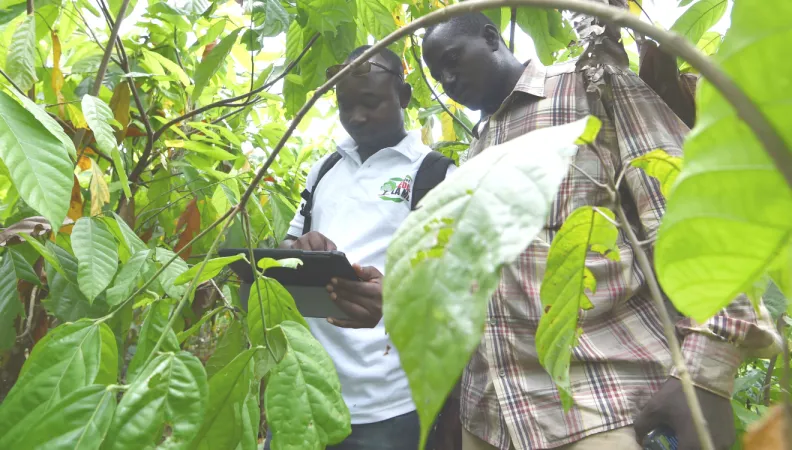Share the page
“The FGEF Has Been Innovation for the Environment for 25 Years”: Stéphanie Bouziges-Eschmann
Published on

The French Global Environment Facility (FGEF) was launched after the first Earth Summit, in 1994. Since then, it has worked towards one singular goal: to create synergies between environmental preservation and sustainable development in local communities. This has been achieved through innovation and a collaborative approach to problem-solving, says the fund’s Secretary-General, Stéphanie Bouziges-Eschmann.
After 25 years of work, where does the FGEF stand today?
Stéphanie Bouziges-Eschmann:
The FGEF promotes the development of different types of innovation: new technologies, new methods and modes of governance, and new approaches to organization or collaboration. These include, for example, community-based management models for forests and protected areas, innovative financial mechanisms for biodiversity, or nature-based solutions in coastal areas.
The Fund has been set up to take risks and develop groundbreaking solutions in untapped markets. It has the courage to support projects that are deemed too risky for other investors, but which have the spark needed to ignite change, to become the drivers of massive transformation of a given sector.
Since its creation, one of the FGEF’s differentiating factors has been its strategy of taking risks, while learning important lessons where things fall through or failures result. It does not support innovation for innovation's sake but with a view to scaling up effective solutions. It targets pilot projects that can be replicated in other areas or countries from the design stage.
To promote this dissemination and scaling-up of solutions, the FGEF also emphasizes the importance of capitalizing on and sharing knowledge. Its actions are guided by lessons learned over the past 25 years. Projects are systematically evaluated and then integrated into networks within thematic clusters. For example, we launched the Mangrove initiative in June 2019, bringing together four projects developed in four different regions of the world. The FGEF aims to develop experience-sharing between stakeholders, to broaden knowledge and to drive change, while improving results.
The year 2020 is shaping up to be a pivotal year for the environment. What will the main challenges be for the FGEF?
First of all, if we look at the issue on a global scale: 75% of the planet’s surface has already been damaged by human activity. One million animal and plant species are at risk of extinction. Deforestation has affected 100 million hectares of land over the last 20 years. About 50% of coral reefs have been destroyed in the last 150 years. Over the past few years, there has been another reported increase in CO2 emissions associated with human activities. Plastic pollution has increased tenfold in 40 years.
Biodiversity is disappearing like never before. Industrial pressure and global warming are destabilizing all of our aquatic ecosystems. Land degradation is becoming increasingly widespread. In short, the rate of damage to the planet is accelerating and it is often the poorest populations who are the first to suffer its effects.
Nowadays, it is clear how closely linked these issues are, particularly where biodiversity preservation and the fight against climate change are concerned. It is essential that our climate objectives do not have a negative impact on ecosystems. The need for an integrated approach to environmental issues was identified by the FGEF some time ago. With ever-greater incentives to develop environmentally-friendly projects for the climate, the oceans and biodiversity, the agro-ecology projects financed by the FGEF perfectly illustrate this approach, benefiting land, forests, biodiversity and the fight against climate change.
With the IUCN World Conservation Congress in June, the COP15 on biodiversity in October and the COP26 on climate in November, 2020 is a pivotal year for the environment. This clustering of events is an opportunity to harmonize political agendas on biodiversity and climate change, something that the FGEF has been calling for since it was first established.
What synergies are there between the FGEF and AFD’s work?
The FGEF aims to disseminate and scale-up the most effective solutions with the support of other financial backers such as Agence Française de Développement (AFD) Group, a key partner and member of the steering committee responsible for financial decision-making on the Fund’s projects. It has adopted a collaborative approach that draws on the complementary expertise of its stakeholders (French or local public bodies, companies, NGOs and research organizations), and often supports projects alongside AFD.
Twenty-five years ago, the FGEF pioneered projects promoting synergy between the environment and development. Environmental issues are now fundamental to AFD Group's activities. The Group is mobilized to achieve the Sustainable Development Goals (SDGs) and, in particular, to lead the fight against climate change, with a 100% Paris Agreement objective. Biodiversity preservation is also a key issue, with the Group investing more heavily in projects that have benefits in this area.
Furthermore, in 2020, the FGEF and AFD's objectives will focus on an integrated approach to sustainable development, encompassing environmental, climate and biodiversity issues.
The FGEF's added value has always been its capacity to support new solutions that complement, and sometimes anticipate, AFD projects. This collaborative effort between the two partner institutions aims to scale-up and, in a broader sense, transform existing models.
